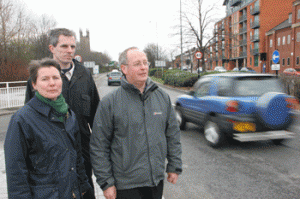 Sheffield Greens have welcomed a new NHS report on road deaths and injuries which strongly recommends a general 20 mph speed limit, without humps and bumps, on residential roads. Directors of Public Health in the North West produced the report, which draws attention to the high rates of death and injury on roads in the region.
Sheffield Greens have welcomed a new NHS report on road deaths and injuries which strongly recommends a general 20 mph speed limit, without humps and bumps, on residential roads. Directors of Public Health in the North West produced the report, which draws attention to the high rates of death and injury on roads in the region.
Sheffield Cllr Rob Murphy comments :
“This report presents compelling evidence that 20 mph limits in residential areas in the North West could dramatically reduce death and serious injury. It indicates that more than 80% of child casualties are on roads with 30mph speed limits. Sheffield clearly will benefit from 20mph speed limits on residential roads but the Lib Dems won’t introduce the citywide scheme that is needed to make this fully effective. I urge all Sheffielders to attend their next Community Assembly meeting to demand that their area should be a 20′s Plenty zone. And ask their local councillors to actively support a citywide scheme. “

I’m sorry, but I don’t agree. I doubt that most motorists would follow this. Obviously reducing the speed of cars will reduce accidents and the severity of accidents when they do happen. But why not 10 mph or zero!?
If you want to reduce road accidents, perhaps there should be better traffic awareness schemes for children. The constant fiddling and dumbing down of the old “look right, look left and look right again” has resulted in a significant increase in road accidents.
Mark,
According to the British Attitudes Survey 72% of drivers support 20 mph limits on residential streets.
I guess the default 20 mph limit has been chosen because of the fact that the chance of a pedestrian being seriously injured or killed if struck by a car is 45% if the car is travelling at 30 mph but only 5% at 20 mph. On balance I think 20 mph seems a fair compromise.
Road accident injuries in Sheffield have actually been decreasing over the last couple of years and partly because of awareness campaigns, but 20 mph speed limits are about more than road safety.
20 mph limits save money, reduce noise and mean a better quality of life for people.
Reduced accelerating and braking in urban areas means cars use less fuel, have less wear and tear and any accidents cause less damage. Fewer and less serious injuries added to less air pollution also means more money for the NHS.